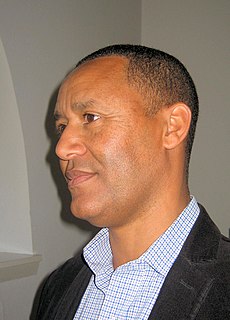A Quote by Zeresenay Alemseged
At age three, if you have a still-growing brain, it's a human behavior. In chimps, by age three, the brain is formed over 90 percent. That's why they can cope with their environment very easily after birth - faster than us, anyway. But in humans, we continue to grow our brains. That's why we need care from our parents.
Related Quotes
We live in the Age of the Higher Brain, the cerebral cortex that has grown enormously over the last few millennia, overshadowing the ancient, instinctive lower brain. The cortex is often called the new brain, yet the old brain held sway in humans for millions of years, as it does today in most living things. The old brain can't conjure up ideas or read. But it does possess the power to feel and, above all, to be. It was the old brain that caused our forebears to sense the closeness of a mysterious presence everywhere in Nature.
The pace at which science has progressed has been too fast for human behaviour to adapt to it. As I said we are still apes. A part of our brain is still a paleo-brain and many of the reactions come from our fight or flight instinct. As long as this part of the brain can take over control the rational part of the brain (we will face these problems).
When I look at the human brain I'm still in awe of it. Every single time you lift off the bone and open the durra and there it is - the human brain, the thing that gives a person a personality, that distinguishes each one of us, that there could be more than 6 billion of us here on this planet with brains that look the same, but each one being distinctly different because of what is going on in that thing. I'll never get over my awe of that.
The human brain became large by natural selection (who knows why, but presumably for good cause). Yet surely most "things" now done by our brains, and essential both to our cultures and to our very survival, are epiphenomena of the computing power of this machine, not genetically grounded Darwinian entities created specifically by natural selection for their current function.
A meme (rhymes with dream) is a unit of information (a catchphrase, a concept, a tune, a notion of fashion, philosophy or politics) that leaps from brain to brain. Memes compete with one another for replication, and are passed down through a population much the same way genes pass through a species. Potent memes can change minds, alter behavior, catalyze collective mindshifts and transform cultures. Which is why meme warfare has become the geopolitical battle of our information age. Whoever has the memes has the power.
Most of the different types of cells in our body die and are replaced every few weeks or months. However, neurons, the primary cell of the nervous system, do not multiply (for the most part) after we are born. That means that the majority of the neurons in your brain today are as old as you are. This longevity of the neurons partially accounts for why we feel pretty much the same on the inside at the age of 10 as we do at age 30 or 77.
There's a lot of research that indicates the brain rewards us for multi-tasking by giving us a shot of neurochemicals whenever we start a new task. Our brain rewards us even as our performance in every task degrades. We don't even notice that our performance is bad. We don't care. We feel like masters of the universe because our brain is chemically rewarding us for multi-tasking.
Why should we be willing to go by faith? We do all things in this world by faith in the word of others. By faith only we know our position in the world, our circumstances, our rights and privileges, our fortunes, our parents, our brothers and sisters, our age, our mortality. Why should Religion be an exception?
Most of our brain cells are glial cells, once thought to be mere support cells, but now understood as having a critical role in brain function. Glial cells in the human brain are markedly different from glial cells in other brains, suggesting that they may be important in the evolution of brain function.
Our brain and our whole nervous system and our whole body are only created in relation to other people and to the environment. So what we have here is an enormously complex notion of both consciousness and unconsciousness. That's why these models get very difficult, because you can't reduce our subjective and intersubjective experience to neural reductions.



































